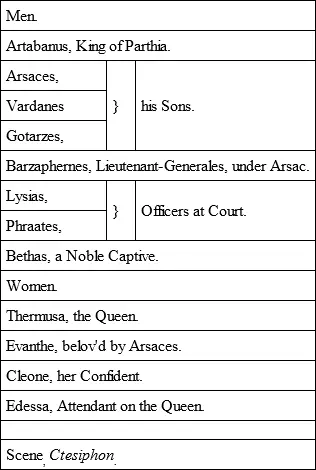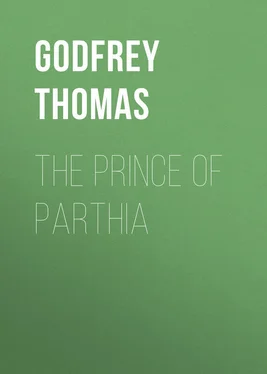Thomas Godfrey - The Prince of Parthia
Здесь есть возможность читать онлайн «Thomas Godfrey - The Prince of Parthia» — ознакомительный отрывок электронной книги совершенно бесплатно, а после прочтения отрывка купить полную версию. В некоторых случаях можно слушать аудио, скачать через торрент в формате fb2 и присутствует краткое содержание. Жанр: foreign_antique, foreign_prose, foreign_dramaturgy, на английском языке. Описание произведения, (предисловие) а так же отзывы посетителей доступны на портале библиотеки ЛибКат.
- Название:The Prince of Parthia
- Автор:
- Жанр:
- Год:неизвестен
- ISBN:нет данных
- Рейтинг книги:5 / 5. Голосов: 1
-
Избранное:Добавить в избранное
- Отзывы:
-
Ваша оценка:
- 100
- 1
- 2
- 3
- 4
- 5
The Prince of Parthia: краткое содержание, описание и аннотация
Предлагаем к чтению аннотацию, описание, краткое содержание или предисловие (зависит от того, что написал сам автор книги «The Prince of Parthia»). Если вы не нашли необходимую информацию о книге — напишите в комментариях, мы постараемся отыскать её.
The Prince of Parthia — читать онлайн ознакомительный отрывок
Ниже представлен текст книги, разбитый по страницам. Система сохранения места последней прочитанной страницы, позволяет с удобством читать онлайн бесплатно книгу «The Prince of Parthia», без необходимости каждый раз заново искать на чём Вы остановились. Поставьте закладку, и сможете в любой момент перейти на страницу, на которой закончили чтение.
Интервал:
Закладка:
The production occurred on April 24, 1767.
Seilhamer gives a probable cast of characters, although only the list of actors is given in the advertisement. Apart from this, little is known of the production: whether or not it pleased the theatre-goers of the time. We can judge, however, from the reading of the play itself, that there was little of extreme dramatic excellence in the situations, the chief claim, from the actor's point of view, being the opportunity to deliver certain very highly coloured, poetical lines modelled after the manner of the Elizabethan drama.
In the publication of "The Prince of Parthia," we have the first printed American tragedy in existence, and in its production we have one of only two plays, written by Americans, and presented on the stage before the Revolution. The other play is George Cockings's "The Conquest of Canada; or, The Siege of Quebec," printed for the author in 1766, and presented in Philadelphia in 1773. We note, in Dr. F. W. Atkinson's estimable Bibliography of American Plays in his possession, that Cockings later described himself as "Camillo Querno, Poet Laureate to Congress."
The interest in the early history of the American drama, which has become evident within recent years, and nowhere more evident than among the student body in our American colleges, induced the Zelosophic Literary Society, encouraged by the University of Pennsylvania, to revive "The Prince of Parthia," which was written by one of their alumni. The production was consummated on March 26, 1915. Even though we have no statement as to the actual manner in which the Douglass Company presented the play originally, we are given every evidence, by those who witnessed the revival, that the play, while containing many excellences, was not of a dramatic character according to modern ideas of stage effectiveness.
The only portrait of Godfrey known to have been in existence was that painted by Benjamin West, in his earlier years. It is interesting to note that in commemoration of the one hundred and fiftieth anniversary of the original production of this play, Dr. Archibald Henderson, of the University of North Carolina, issued an édition de luxe of "The Prince of Parthia," with an extended introduction, historical, biographical and critical (Boston: Little, Brown & Co., 1917).
ADVERTISEMENT
Our Author has made Use of the licentia poetica in the Management of this Dramatic Piece; and deviates, in a particular or two, from what is agreed on by Historians: The Queen Thermusa being not the Wife of King Artabanus , but (according to Tacitus , Strabo and Josephus ) of Phraates ; Artabanus being the fourth King of Parthia after him. Such Lapses are not unprecedented among the Poets; and will the more readily admit of an Excuse, when the Voice of History is followed in the Description of Characters.
DRAMATIS PERSONÆ

A TRAGEDY
ACT I
Scene I. The Temple of the Sun
He comes, Arsaces comes, my gallant Brother
(Like shining Mars in all the pomp of conquest)
Triumphant enters now our joyful gates;
Bright Victory waits on his glitt'ring car,
And shews her fav'rite to the wond'ring croud;
While Fame exulting sounds the happy name
To realms remote, and bids the world admire.
Oh! 'tis a glorious day: – let none presume
T'indulge the tear, or wear the gloom of sorrow;
This day shall shine in Ages yet to come,
And grace the Parthian story.
Glad Ctes'phon
Pours forth her numbers, like a rolling deluge,
To meet the blooming Hero; all the ways,
On either side, as far as sight can stretch,
Are lin'd with crouds, and on the lofty walls
Innumerable multitudes are rang'd.
On ev'ry countenance impatience sate
With roving eye, before the train appear'd.
But when they saw the Darling of the Fates,
They rent the air with loud repeated shouts;
The Mother shew'd him to her infant Son,
And taught his lisping tongue to name Arsaces:
E'en aged Sires, whose sounds are scarcely heard,
By feeble strength supported, tost their caps,
And gave their murmur to the gen'ral voice.
The spacious streets, which lead up to the Temple,
Are strew'd with flow'rs; each, with frantic joy,
His garland forms, and throws it in the way.
What pleasure, Phraates, must swell his bosom,
To see the prostrate nation all around him,
And know he's made them happy! to hear them
Tease the Gods, to show'r their blessings on him!
Happy Arsaces! fain I'd imitate
Thy matchless worth, and be a shining joy!
Hark! what a shout was that which pierc'd the skies!
It seem'd as tho' all Nature's beings join'd,
To hail thy glorious Brother.
Happy Parthia!
Now proud Arabia dreads her destin'd chains,
While shame and rout disperses all her sons.
Barzaphernes pursues the fugitives,
The few whom fav'ring Night redeem'd from slaughter;
Swiftly they fled, for fear had wing'd their speed,
And made them bless the shade which saf'ty gave.
What a bright hope is ours, when those dread pow'rs
Who rule yon heav'n, and guide the mov'ments here,
Shall call your royal Father to their joys:
In blest Arsaces ev'ry virtue meets;
He's gen'rous, brave, and wise, and good,
Has skill to act, and noble fortitude
To face bold danger, in the battle firm,
And dauntless as a Lion fronts his foe.
Yet is he sway'd by ev'ry tender passion,
Forgiving mercy, gentleness and love;
Which speak the Hero friend of humankind.
And let me speak, for 'tis to him I owe
That here I stand, and breath the common air,
And 'tis my pride to tell it to the world.
One luckless day as in the eager chace
My Courser wildly bore me from the rest,
A monst'rous Leopard from a bosky fen
Rush'd forth, and foaming lash'd the ground,
And fiercely ey'd me as his destin'd quarry.
My jav'lin swift I threw, but o'er his head
It erring pass'd, and harmless in the air
Spent all its force; my falchin then I seiz'd,
Advancing to attack my ireful foe,
When furiously the savage sprung upon me,
And tore me to the ground; my treach'rous blade
Above my hand snap'd short, and left me quite
Defenceless to his rage; Arsaces then,
Hearing the din, flew like some pitying pow'r,
And quickly freed me from the Monster's paws,
Drenching his bright lance in his spotted breast.
How diff'rent he from arrogant Vardanes?
That haughty Prince eyes with a stern contempt
All other Mortals, and with lofty mien
He treads the earth as tho' he were a God.
Nay, I believe that his ambitious soul,
Had it but pow'r to its licentious wishes,
Would dare dispute with Jove the rule of heav'n;
Like a Titanian son with giant insolence,
Match with the Gods, and wage immortal war,
'Til their red wrath should hurl him headlong down,
E'en to destruction's lowest pit of horror.
Methinks he wears not that becoming joy
Which on this bright occasion gilds the court;
His brow's contracted with a gloomy frown,
Pensive he stalks along, and seems a prey
To pining discontent.
Интервал:
Закладка:
Похожие книги на «The Prince of Parthia»
Представляем Вашему вниманию похожие книги на «The Prince of Parthia» списком для выбора. Мы отобрали схожую по названию и смыслу литературу в надежде предоставить читателям больше вариантов отыскать новые, интересные, ещё непрочитанные произведения.
Обсуждение, отзывы о книге «The Prince of Parthia» и просто собственные мнения читателей. Оставьте ваши комментарии, напишите, что Вы думаете о произведении, его смысле или главных героях. Укажите что конкретно понравилось, а что нет, и почему Вы так считаете.












